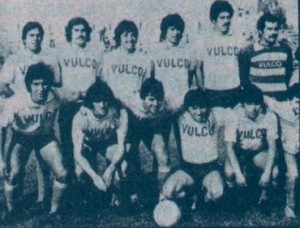So, top flight. The Apertura: it was won by Colo-Colo.
 They won all three matches in the final tournament, an excellent beginning of the season.
They won all three matches in the final tournament, an excellent beginning of the season.
 Universidad de Chile – 3rd, and
Universidad de Chile – 3rd, and
 Cobreloa – 4th. That set the tone of the whole season – the three traditional favourites plus the exciting newcomer rapidly establishing itself as a solid power. But the Apertura meant little and, as it turned out, even less during Campeonato Oficial – bonus points carried over played no role at all.
Cobreloa – 4th. That set the tone of the whole season – the three traditional favourites plus the exciting newcomer rapidly establishing itself as a solid power. But the Apertura meant little and, as it turned out, even less during Campeonato Oficial – bonus points carried over played no role at all.
After 30 championship rounds were played, the picture was crystal clear… well, not really at the bottom of the league. Three outsiders were visible from the start of the championship – Rangers (Tacna) ended last with 15 points. Santiago Morning (Santiago) was 15th also with 15 points, but better goal-difference, and Deportes La Serena (La Serena) – 14th with 19 points. These three had to be relegated and normally historic records of the season point out exactly that. The two teams just above relegation zone – Palestino (Santiago), 13th with 24 points, and Union Espanola (Santiago) – 12th with 25 points had to proceed to the promotion/relegation tournament. But… the league enlargement decreased the number of the relegated to 2 teams. One may think that the highest placed team will survive… and will be wrong: attendance numbers made ‘a good venue’ team of Rangers and the last team in the championship remained in the league. Santiago Morning and Deportes La Serena were relegated. Palestino and Union Espanola went to the promotion/relegation tournament, won there, and also escaped relegation – at least on relative merit, unlike Rangers, which, having been the worst team this season did not have to fret at all. So much for the lower end.
Higher up, the league was seemingly divided into two other groups – 6 teams on top, much stronger than the rest and 7 comfortable mid-table teams much stronger than the outsiders. A good season for two smaller provincial clubs, one may say.
 Deportes Arica (Arica) finished 10th. Standing from left: René Jara, José Burgos, Juan Amigo, Adrián Pérez, Hernán Ibarra, Guillermo Cartes;
Deportes Arica (Arica) finished 10th. Standing from left: René Jara, José Burgos, Juan Amigo, Adrián Pérez, Hernán Ibarra, Guillermo Cartes;
First row: Enrique Correa (utilero), Enrique Castillo, Francisco Valdés, Héctor Moscoso, Carlos Díaz, Jorge Cabrera.
 Regional Atacama (Copiapo) ended 9th.
Regional Atacama (Copiapo) ended 9th.
The top 6 were obviously stronger than the rest of the league, but there was no great race for the title – in fact, one team really run the show, the rest largely battled for positions between 2nd and 6th.
 Universidad Catolica finished 6th with 38 points – either a bit unlucky, or dropping its earlier form.
Universidad Catolica finished 6th with 38 points – either a bit unlucky, or dropping its earlier form.
 Naval (Talcahuano) was 5th, beating Universidad Catolica on goal-difference.
Naval (Talcahuano) was 5th, beating Universidad Catolica on goal-difference.
 Magallanes (Santiago) was 4th with 39 points – a good season for the otherwise declining old club.
Magallanes (Santiago) was 4th with 39 points – a good season for the otherwise declining old club.
With 40 points, Universidad de Chile took the bronze medals – the only club benefiting from bonus point carried over from the Apertura: without it, they would have been 4th, losing to Magallanes on goal-difference.
Colo-Colo was 2nd with 41 points. They would have been exactly at the same place even without bonus points, but not higher… Second place is hardly a success for Colo-Colo, but they had to live with it. Perhaps they paid heavy price for their inability to win – Colo-Colo tied 11 matches. They lost just the same number of games as the champions – 5 – so, it was really a matter of winning, not collecting single points.
With Colo-Colo struggling to win, Cobreloa (Calama) did not really have an opponent: they lost 5 games, tied 6, and won 19. 69-23 goal-difference and 45 points. Attack was the key – Cobreloa scored 28 goals more than Colo-Colo, having pretty much the same defensive record. That meant that they not only aimed at winning, but had the scoring power to actually achieve it.
 Standing from left: Oscar Wirth, Mario Soto, Eduardo Gomez, Enzo Escobar, Victor Merello, Hugo Tabilo;
Standing from left: Oscar Wirth, Mario Soto, Eduardo Gomez, Enzo Escobar, Victor Merello, Hugo Tabilo;
Crouching: Luis Ahumada, Hector Puebla, Juan Carlos Letelier, Jorge Siviero, Washington Olivera.
Second title for Cobreloa! That was the season Cobreloa really established itself among the Chilean football favourites: no longer a lucky and temporary upstart, no more doubts about them. Their naturalized coach Vicente Cantatore (Argentine born, but after spending years playing in Chile, he took Chilean citizenship) was instrumental, making not only the club known – he was also rapidly gaining excellent reputation. The sweetness of success.


